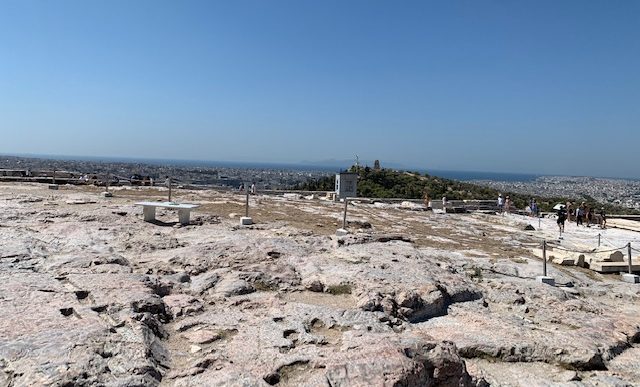Arrival
In A.D. 51, a ship just arrived from Athens sailed into the blue waters of the Saronic Bay. A man disembarked, facing an eight-mile walk to the city of Corinth. He was alone—and disheartened.
Paul’s time in Athens had been uncharacteristically unfruitful. It was a city filled with every kind of vice, and thick with both idols and philosophers. The apostle had entered the religio-philosphical fray with his customary energy and scholarly gifts. He then found himself escorted to Mars Hill. Here, a large quadrangle had been carved out of the rocky hill, with stone seats for Athen’s Council of Elders to sit and try criminal cases. Between cases, they engaged in a favorite pastime: debate. As a result of Paul’s vigorous and articulate revelation of the “Unknown God,” a very small group that was present that day believed. But there is no biblical record of a church having been established, nor did Paul write any letters that we know of to any established work in that city.
City of Vice
He heads for Corinth, a short sail away. Here was a melting pot of commerce, classes, and nationalities—merchants and ex-soldiers, philosophers and athletes. Corinthians were steeped in the cultic worship of Aphrodite with its ritualistic prostitution. One thousand professional prostitutes—hieroduli—served in her temple.
Opportunity
Yet, the apostle was deeply interested in the Greeks. In subsequent letters to the churches he would draw many illustrations from their stadium and races and boxing matches, their courts of justice, and their theaters.
Paul develops an intense affection for these Corinthians. In the synagogue, he experiences the usual intense opposition and, indeed, blasphemy. Frustrated, he turns to the Gentiles with wonderful success over the next eighteen months. In fact, the Lord speaks to him one night with this divine encouragement:
Don’t be afraid, but keep on speaking, and don’t be silent. Acts 18:9-10
Extremely Difficult
So, what about the church that was established? F.W. Farrar, Dean of Canterbury at the turn of the last century, wrote:
He never had to deal with any church so inflated and so immoral, so indifferent to his sufferings, so contemptuous toward his teaching, or so tolerant of the opposition . . . of his personal enemies and rivals.
Each year, in early August, I arrive at the apostle’s letters to the Corinthians. I prepare myself yet again to be reminded of the gritty nature of ministry, the toxicity of sin in any band of believers, and the power of the Gospel as it meets a deeply hostile culture.
Paul’s voice throughout both letters is always urgent:
- sometimes in tender regard,
- or addressing serious questions of immorality in the church body,
- or clarifying issues for believers struggling with their old pagan ways.
And in a few days I’ll reach Chapter 13 in the first letter. It was, says one writer, “born in a heroic soul burning with the love of Christ.”
I recently came across a short essay by writer, Lois A. Cheney:
I love it when people argue that there is no love, and then stand stupid before an act of love. I love it when people argue that there is no mercy, and whistle and glance the other way when an act of mercy looms in front of them. I love it when people say there is no Christ, and frown and mumble at the life that lives in Jesus, who is stalking the world.
Ah. And the life and love of Jesus stalks the world in you and me.
Photo: Mars Hill, present day, by Samuel Celovsky

